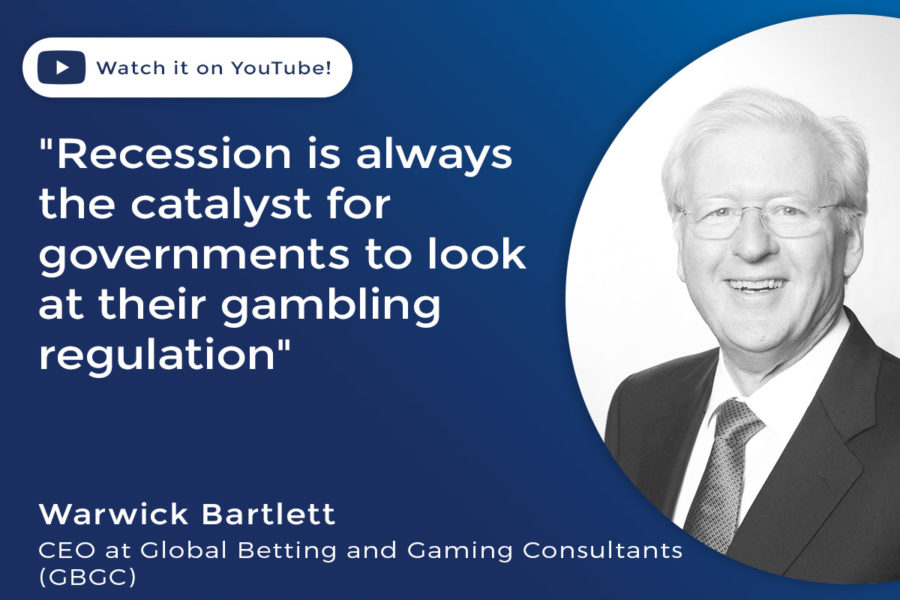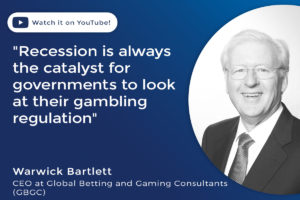Warwick Bartlett: “Recession is always the catalyst for governments to look at their gambling regulation”

Warwick Bartlett, chief executive at Global Betting and Gaming Consultants, offers Focus Gaming News his take on the future of global gaming following the impact of Covid-19 and ongoing regulatory changes.
Exclusive interview.- Warwick Bartlett’s seen the global gaming industry develop and evolve for long enough to foresee when change is afoot.
The chief executive of Global Betting and Gaming Consultants (GBGC) forecasts an economic boom after the Covid-19 pandemic, but that might not be the only boon for gaming since he also expects that a likely recession in many jurisdictions could lead to a flexibilisation of gaming regulation.
Bartlett says: “The financial markets are being driven by the vaccine roll-out, and it’s going very well in the United States and very well in the UK, and people are predicting that once we open up, there’ll be a boom like we saw after the first pandemic of 1918.
“People have saved money, they’ve reduced their credit card exposure and they basically want to get out and do the things they ordinarily used to do.”
But despite the boom, he also predicts a recession that could prompt governments to act, which could be good for all forms of gambling, including land-based casinos.
“The great thing about gambling is that it’s a passive tax; it’s not compulsory.”
Warwick Bartlett, chief executive at Global Betting and Gaming Consultants.
“After that, the government’s finances are in a bad state, they’ve spent so much money, it’s got to be paid for at some point.
“The chances are that we’re going to go into a recession. We’ve already said at GBGC that that is always the catalyst for governments to look at their gambling regulation, because the great thing about gambling is that it’s a passive tax; it’s not compulsory.”
The lure of land-based casinos
He notes that casinos could become attractive to governments again, not only for tax revenues but also to generate jobs.
“People are seriously looking at casinos again because those things employ between 3,000 and 7,000 people,” he says. “People are going to need jobs, and some of these jobs at casinos are highly paid.
“[Casinos] bring in tax revenue, they boost tourism – look what it’s done for Singapore. So I can see more countries looking at their regulation and relaxing the conditions.”
Developments in gaming in Latam and Asia
Bartlett notes that GBGC had already seen the pandemic kickstart regulation in several jurisdictions.
“The C-19 pandemic has spurred governments, especially in Latin America, to pass igaming regulation that’s been stalled for many years.”
Warwick Bartlett, chief executive at Global Betting and Gaming Consultants.
“In our research in the global gambling report, it suggests that the C-19 pandemic has spurred governments, especially in Latin America, to pass igaming regulation that’s been stalled for many years,” he says.
“So the move is to more liberalisation of the markets, where the markets are controlled, taxed and regulated, which is a good thing for the industry.”
Bartlett notes that he expects that to include Asia, with Vietnam currently testing opening casinos more to locals. He expects that even China will legalise gaming at some point.
“As I said previously I still think China will at some point in the future legalise gambling,” he says “They’re following the same pattern the US has done.
“You try to stop the illegal gambling, you realise that doesn’t work, you try to eliminate it completely, then you decide, well, you can’t continue to criminalise ordinary people’s behaviour, we might as well regulate it and tax it.
“The appetite for Chinese people to gamble is very strong. The propensity to gamble among Chinese citizens is high.
“The Chinese gambler is the most sought after person as far as the gambling industry is concerned, so they don’t want to create a situation in which people lose all their money and become completely dependent on the state, so it’s understandable, but I think they’ll probably, eventually over a ten-year period, take small baby steps to achieve that.
“A lot of people think I’m crazy, but they said that 10 years ago when I said the US would open up.”
Online gaming crosses a milestone
As for online gaming, Bartlett sees the sector as having made a landmark advance during the pandemic.
“Provisional data from our interactive gambling report shows that igaming has increased its share of global gambling to 15 per cent. For many years it was stuck at 9 per cent,” he says.
“How much of that they’ll hang onto is kind of a moot point. When premises open up, will people go back to them in the numbers that they did bearing in mind that many have now migrated online?”
“Igaming has increased its share of global gambling to 15 per cent.”
Warwick Bartlett, chief executive at Global Betting and Gaming Consultants.
However, Bartlett expects that a continued reduction of retail betting outlets will only hasten the transition online.
Noting that Entain has cut 1,500 shops since 2018, he says that in some cases the customer will be left with no choice.
“My prediction is that more shops are going to close because there’s more regulation on those premises, there’s less opportunity for profit, the overheads are higher, and you’ve got this competition from online,” he says.
“So I think possibly more shops are going to close, which will work in the favour of the online business.”
Check out the full interview with Warwick Bartlett on the Focus Gaming News YouTube channel. Don’t forget to subscribe!











